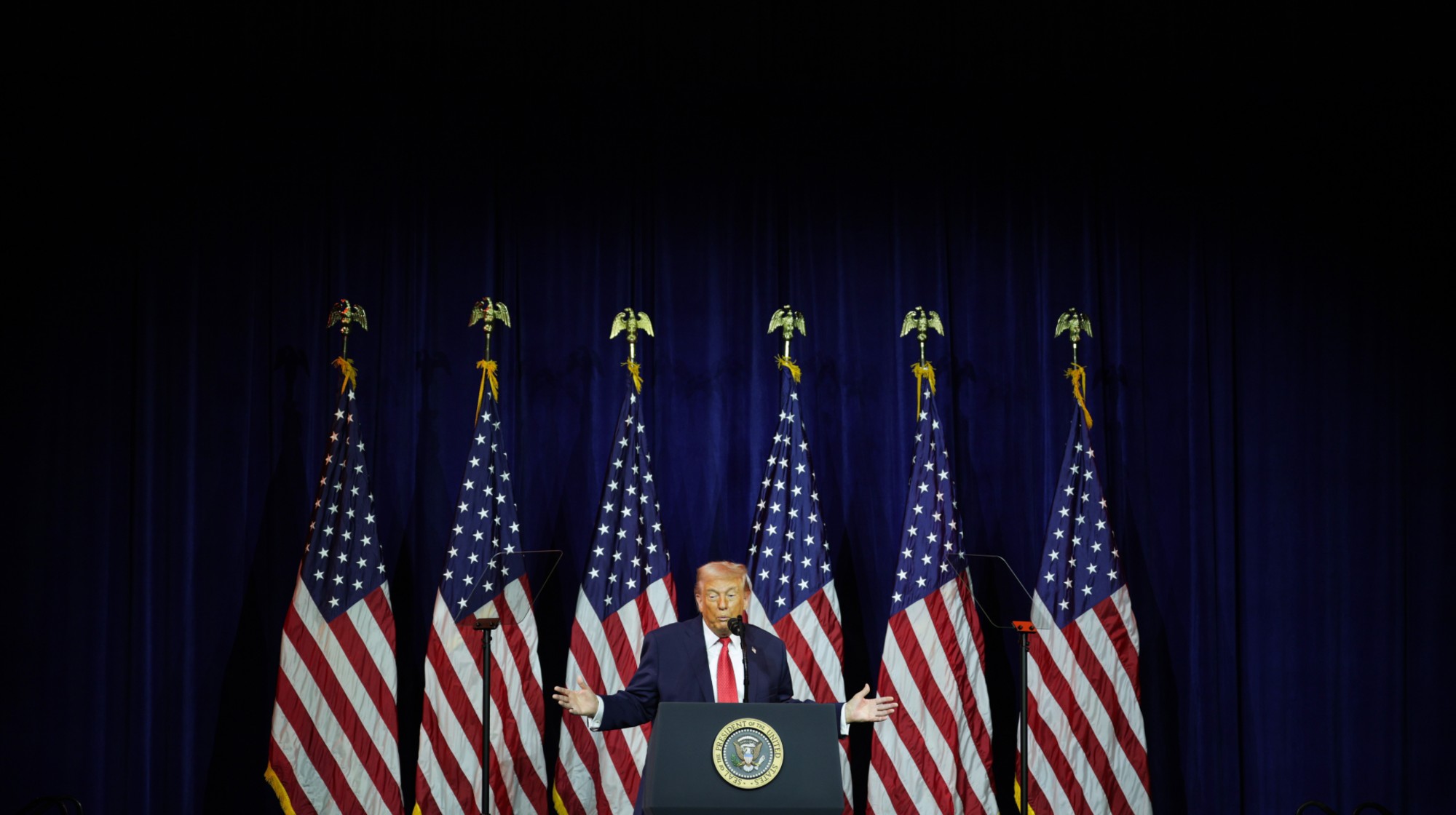The only thing we don't know about the outcome of Trump's impeachment trial
Trump wants Senate Republicans to kneel before him in a gratuitous display of abject fealty. Will they do it?


A free daily email with the biggest news stories of the day – and the best features from TheWeek.com
You are now subscribed
Your newsletter sign-up was successful
The outcome of the Senate's impeachment trial of President Trump is not in doubt. The president is going to be acquitted, most likely by a party-line vote.
There's not even a lot of suspense about how the trial will be conducted. Senate Minority Leader Chuck Schumer (D-N.Y.) can rail all he wants about the unfairness of the rules, as he did on Tuesday. Rep. Adam Schiff of (D-Calif.) can declare, as he also did (somewhat absurdly) on the opening day of the Senate trial, that procedural votes about whether to call witnesses and subpoena documents are more important than the eventual vote about whether, for the first time in American history, the Senate will convict and remove a president from office. But the outcome has been clear from the beginning.
Senate Majority Leader Mitch McConnell (R-Ky.) is running the show, he's a rabidly partisan Republican, and he's a master of using the upper chamber's arcane rules, procedures, and history to achieve the outcomes he wants. McConnell wanted decisions about witnesses and supporting documents to be tabled until after the lengthy opening statements that will take up much of the next week, and that's exactly what he's gotten. When the Senate returns to the subject, how likely is it that the outcome will be different? Barring some earthshaking revelation in the House managers' opening statement, not very.
The Week
Escape your echo chamber. Get the facts behind the news, plus analysis from multiple perspectives.

Sign up for The Week's Free Newsletters
From our morning news briefing to a weekly Good News Newsletter, get the best of The Week delivered directly to your inbox.
From our morning news briefing to a weekly Good News Newsletter, get the best of The Week delivered directly to your inbox.
But then what exactly are we doing? Is the entire impeachment a Kabuki show where each side pantomimes outrage, gestures at existential threats to the republic, and then votes exactly the way they would have done before the whole performance got underway?
In all respects but one, that may in fact be the case. And that might not be such a bad thing.
Trump's actions have been clear from the moment in mid-September when the White House released a (modified) readout of his notorious July 25 phone call with Ukraine President Volodymyr Zelensky, and any lingering uncertainties have been cleared up by witnesses who testified in the House's impeachment inquiry. Trump wanted Zelensky to publicly announce that Ukraine was opening an investigation of his most formidable political rival for reelection, former Vice President Joe Biden, and his son Hunter Biden — and Trump placed a hold on aid to Ukraine in order to get what he wanted. That's an act of extortion, using (and abusing) the powers of the presidency to give Trump a personal political advantage.
I think that clearly warrants impeachment and removal from office, and nearly all Democrats in the House and Senate appear to think the same thing. But Republicans don't agree — or at least they say they don't. And that's where the one bit of genuine uncertainty hanging over the Senate trial comes in.
A free daily email with the biggest news stories of the day – and the best features from TheWeek.com
The trial isn't really about the facts, which have been established. It concerns a matter of judgment about those facts. "How bad is X?" We have ample reason to suspect that large numbers of Senate Republicans are disgusted with Trump. Many of them have been from the beginning, and what he was trying to do with Ukraine turns their stomachs, for all kinds of reasons: It offends their patriotism, their sense of the rules of political fair play, and their policy commitment to support Ukraine in its ongoing conflict with Russia.
But here's the thing: This disgust doesn't at all mean they will turn on Trump, which would also mean turning on his supporters in the Republican electorate. They are no more likely to do this now than party leaders were willing to adjust the rules during the 2016 primaries to ensure Trump couldn't become the GOP nominee, or to move against him at the Republican National Convention that summer, or to undertake a kamikaze mission to ensure his defeat in the general election that fall. All that's changed between then and now is that Trump's power over the party's voters and its institutional apparatus is far more complete. There will be no "come to Jesus" moments of mass conversion in the Senate over the coming days and weeks. To believe otherwise at this point is to succumb to fantasy.
But this doesn't mean that what Republican Senators say about Trump when the trial comes to a close has been determined. They aren't going to vote to convict and remove him. But some of them may well be willing to state what many of them feel, which is that what Trump did and was trying to do with Ukraine was wrong, even if it doesn't warrant booting him out of the White House, especially when there's an election less than 10 months away. That falls about 1,000 miles short of what Democrats want, but it's not nothing.
On the contrary, it's quite a lot compared to the alternative, which Trump himself clearly prefers. From the start of this whole sordid episode, the president has insisted that his July phone call with Zelensky was "perfect." Indeed, that deranged conviction appears to have been what led the White House to release its incriminating readout of the conversation. The president has no intention of conceding an inch of ground on the matter, and he is demanding that members of his party line up behind him in expressing fulsome support for his efforts to strongarm a vastly weaker country into digging up dirt on his domestic political rival. Trump wants Senate Republicans to kneel before him in a gratuitous display of abject fealty.
That aim was obvious on Tuesday, as members of Trump's legal team took the position that the president did nothing at all wrong in his dealings with Ukraine and was merely a victim of a procedurally reckless witch hunt undertaken by bloodthirsty Democrats. If that continues, Senate Republicans will find themselves backed into a corner, pushed by the momentum of the White House's arguments to affirm that Trump is entirely innocent of wrongdoing.
Will Republicans go along with being railroaded? Or will they stay by the president's side when it comes time for a verdict but make a point of stating the truth of the matter on the record — that Donald Trump crossed a serious line that he and those who follow him at the head of the executive branch should never come close to crossing again? Former Connecticut Sen. Joe Lieberman (D) said something analogous about Bill Clinton's actions during his impeachment in 1999, and even worked to persuade his colleagues to entertain a formal censure of the president. That should be the realistic standard to which Senate Republicans are held today.
Whether at least some members of the president's own party can be convinced to rise up to meet that standard may be the only thing we don't know about the outcome of Trump's impeachment trial.
Want more essential commentary and analysis like this delivered straight to your inbox? Sign up for The Week's "Today's best articles" newsletter here.
Damon Linker is a senior correspondent at TheWeek.com. He is also a former contributing editor at The New Republic and the author of The Theocons and The Religious Test.
-
 Regent Hong Kong: a tranquil haven with a prime waterfront spot
Regent Hong Kong: a tranquil haven with a prime waterfront spotThe Week Recommends The trendy hotel recently underwent an extensive two-year revamp
-
 The problem with diagnosing profound autism
The problem with diagnosing profound autismThe Explainer Experts are reconsidering the idea of autism as a spectrum, which could impact diagnoses and policy making for the condition
-
 What are the best investments for beginners?
What are the best investments for beginners?The Explainer Stocks and ETFs and bonds, oh my
-
 Democrats pledge Noem impeachment if not fired
Democrats pledge Noem impeachment if not firedSpeed Read Trump is publicly defending the Homeland Security secretary
-
 The billionaires’ wealth tax: a catastrophe for California?
The billionaires’ wealth tax: a catastrophe for California?Talking Point Peter Thiel and Larry Page preparing to change state residency
-
 Trump fears impeachment if GOP loses midterms
Trump fears impeachment if GOP loses midtermsSpeed Read ‘You got to win the midterms,’ the president said
-
 Bari Weiss’ ‘60 Minutes’ scandal is about more than one report
Bari Weiss’ ‘60 Minutes’ scandal is about more than one reportIN THE SPOTLIGHT By blocking an approved segment on a controversial prison holding US deportees in El Salvador, the editor-in-chief of CBS News has become the main story
-
 Democrat files to impeach RFK Jr.
Democrat files to impeach RFK Jr.Speed Read Rep. Haley Stevens filed articles of impeachment against Health and Human Services Secretary Robert F. Kennedy Jr.
-
 Has Zohran Mamdani shown the Democrats how to win again?
Has Zohran Mamdani shown the Democrats how to win again?Today’s Big Question New York City mayoral election touted as victory for left-wing populists but moderate centrist wins elsewhere present more complex path for Democratic Party
-
 Millions turn out for anti-Trump ‘No Kings’ rallies
Millions turn out for anti-Trump ‘No Kings’ ralliesSpeed Read An estimated 7 million people participated, 2 million more than at the first ‘No Kings’ protest in June
-
 Ghislaine Maxwell: angling for a Trump pardon
Ghislaine Maxwell: angling for a Trump pardonTalking Point Convicted sex trafficker's testimony could shed new light on president's links to Jeffrey Epstein
